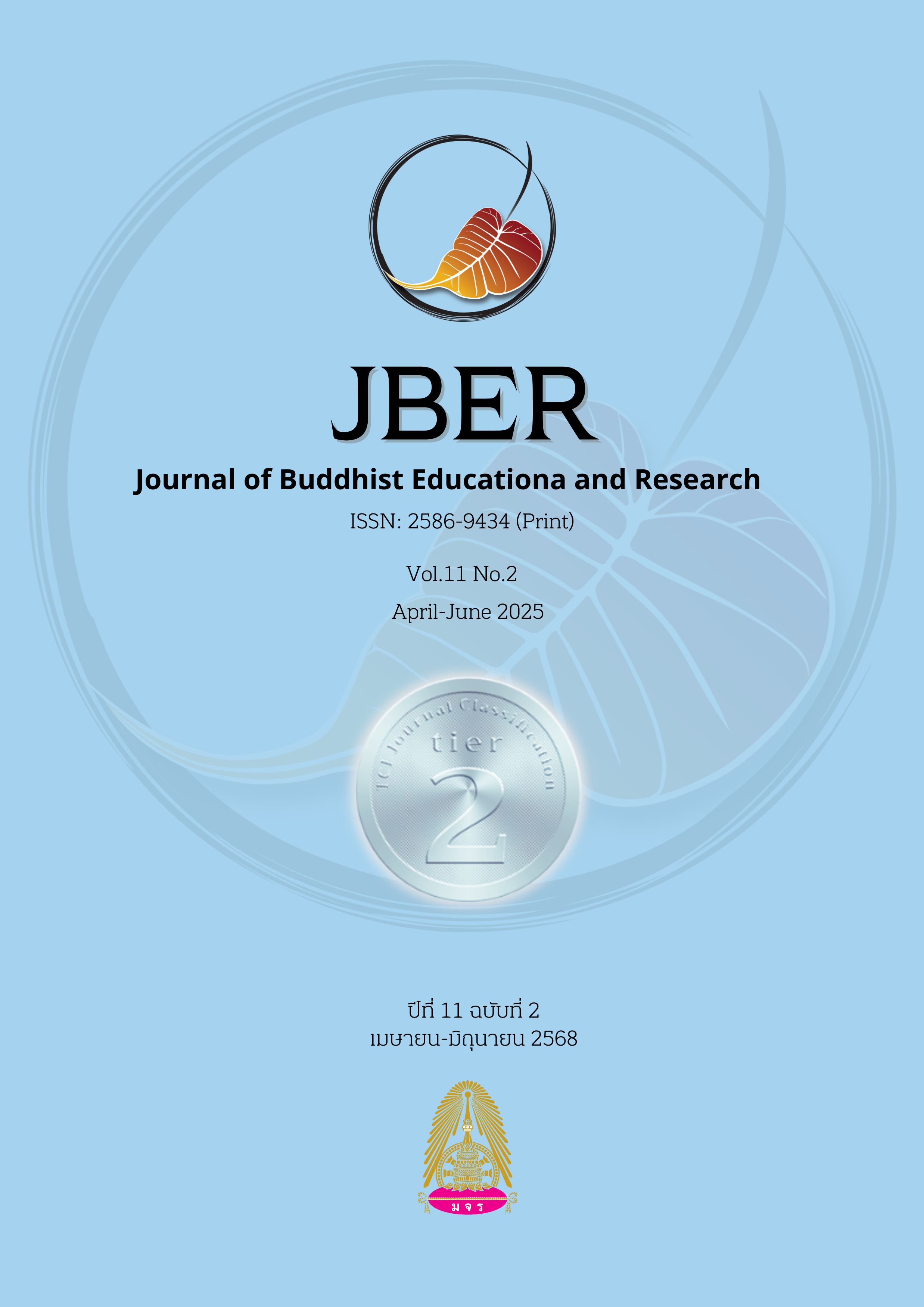Experience-Based Learning Activities on the Four Noble Truths to Develop Causal Thinking Skills in Primary School Year 5 Students at Ramkhamhaeng Networking Schools, Sukhothai Province
Keywords:
Learning activities, Learning the 4 Noble Truths, Causal thinking skillsAbstract
This research is qualitative research. The objectives are 1) to study the current status and problems of learning management on the Four Noble Truths for Grade 5 students in the Ramkhamhaeng Network School, Sukhothai Province, and 2) to develop learning activities based on experience on the Four Noble Truths to develop causal thinking skills for Grade 5 students. The main informants are 8 teachers in the Ramkhamhaeng Network School, Sukhothai Province and 74 students. The research area is Ban Muang Kao “Sri Intratit” School, Mueang District, Sukhothai Province. The research methodology is derived from a purposive sampling of Grade 5 students of Ban Muang Kao “Sri Intratit” School. The research instruments are: 1) A manual for organizing learning activities on the Four Noble Truths to develop causal thinking skills for Grade 5 students and 2) In-depth interview questions using descriptive data analysis. The results of the research found that the current status and problems of learning To develop the causal thinking skills of the 5th grade students of the Ramkhamhaeng Network School, Sukhothai Province, in all 4 aspects, both groups of informants agreed that the current learning activity organization process of teachers using the teaching method in Buddhism is still not consistent with the needs of the students and lacks the integration of causal thinking skills, causing students to lack knowledge of Buddhist principles, unable to explain and apply them to their daily lives. In addition, teachers lack knowledge in developing teaching media and do not integrate causal thinking skills, resulting in students lacking motivation and unable to connect Buddhist principles with daily lives. The researcher therefore used the results of the study of the current conditions and problems of learning management to develop causal thinking skills to develop the organization of learning activities on the Four Noble Truths to develop causal thinking skills of the 5th grade students, enabling them to learn through actual practice, linking the Four Noble Truths with real situations, enhancing their analytical thinking skills and finding solutions rationally, and also helping to enhance the characteristics of being a good Buddhist according to the learning standards of the Buddhism subject appropriately.
References
กรมการศาสนา กระทรวงวัฒนธรรม. (2551). จริยธรรมสำหรับเด็กและเยาวชน. กรุงเทพฯ: ชุมนุมสหกรณ์การเกษตรแห่งประเทศไทย.
กระทรวงศึกษาธิการ. (2551). หลักสูตรแกนกลางการศึกษาขั้นพื้นฐาน พุทธศักราช 2551. กรุงเทพฯ: โรงพิมพ์การทำงานสำหรับนักศึกษา สาขาวิชาศิลปะศาสตร์ในสถาบันราชภัฏ.
กิ่งแก้ว อารีรักษณ์ และคณะ. (2549). การจัดการเรียนรู้โดยใช้รูปแบบหลากหลาย: องค์ความรู้จากการวิจัยและพัฒนาเพื่อปฏิรูปการเรียนรู้ทั้งโรงเรียน. กรุงเทพฯ: เกรทเอ็ดดูเคชั่น จำกัด.
ทิศนา แขมมณี. (2551). ศาสตร์การสอน: องค์ความรู้เพื่อการจัดกระบวนการเรียนรู้ที่มีประสิทธิภาพ. กรุงเทพฯ: สำนักพิมพ์แห่งจุฬาลงกรณ์มหาวิทยาลัย.
ลัดดา ศิลาน้อย และคณะ. (2544). แนวทางการจัดการเรียนรู้ที่ส่งเสริมการคิดอย่างมีวิจารณญาณ. กรุงเทพฯ: สำนักพิมพ์มหาวิทยาลัยเกษตรศาสตร์.
สมพงษ์ จิตระดับ. (2530). การเรียนรู้ผ่านประสบการณ์. กรุงเทพฯ: สำนักพิมพ์มหาวิทยาลัยเกษตรศาสตร์.
Kolb, D. A. (1984). Experiential learning: Experience as the source of learning and development. Englewood Cliffs, NJ: Prentice Hall.
Wittrock, M. C. (1990). Generative processes of comprehension. Educational Psychologist, 24(4), 345–376.
Downloads
Published
How to Cite
Issue
Section
Categories
License
Copyright (c) 2025 Journal of Buddhist Education and Research (JBER)

This work is licensed under a Creative Commons Attribution-NonCommercial-NoDerivatives 4.0 International License.





